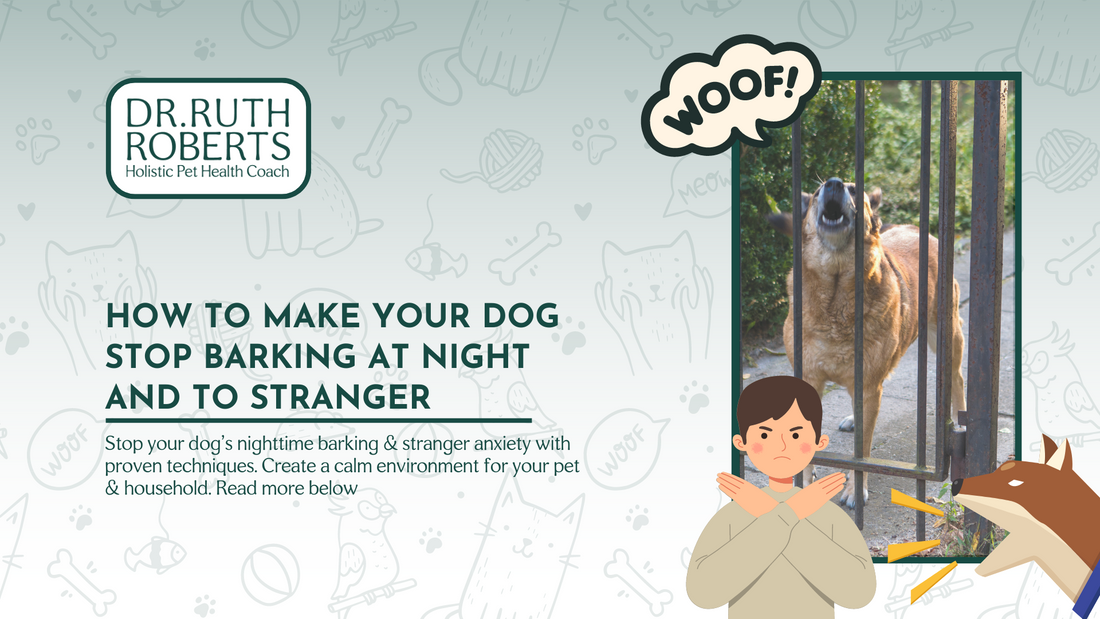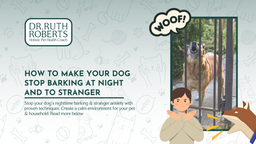If your dog barks at night or at strangers, causing stress and sleepless nights, you’re not alone. This is a common challenge for many pet owners, but luckily, there are effective ways to manage it. In this blog, we'll guide you through some practical tips and strategies to help your dog stay quiet at night and remain calm around new people. We’ll cover why dogs bark in these situations and share some proven training techniques to help bring peace back to your household.
Why Do Dogs Barking
Dogs talk a lot! They use barks, growls, whines, and howls to communicate with us. Living with people can even change how animals communicate. showed that tame foxes bred by humans for generations started making more sounds aimed at humans. This suggests that dogs might have learned to vocalize more when they're around us, just like they've learned to understand our words and gestures.
And just like dogs can learn from us, scientists are learning from them too! We're trying to decode the meaning behind dogs' barks. While barks might seem like random noise, they actually have different meanings depending on the situation. Thanks to years of research and dedication, here's the breakdown on some known reasons behind dog barks:
- Expression: Barking can be a simple way for dogs to get your attention, say hello, or express excitement. Think of it as their language.
- Alerting the Packs: Dogs have a strong protective instinct and will bark to warn you or their canine family about something strange, like a noise outside or someone approaching the house.
- Feeling Fearful: If a dog feels scared or threatened, barking is a natural defense mechanism to warn off the perceived danger.
- Boredom Woofers: A bored dog with nothing to do might resort to barking for entertainment or attention.
- Marking Their Turf: Some dogs bark to claim their territory and ward off intruders, including other dogs or even unfamiliar people.
Barking is normal, but it can become problematic when it's excessive. Constant barking disrupts the peace for you, your neighbors, and anyone in earshot. In some cases, it can even escalate to conflicts with neighbors or animal control.
How to Make a Dog Stop Barking at Night
Nighttime barking can disturb the peace of a quiet night and interrupt everyone's sleep. This behavior can stem from several causes. Dogs possess enhanced senses and can detect sounds and movements at night that humans might overlook, leading to barking at minor disturbances like passing cars or rustling animals. Additionally, dogs may feel lonely or anxious if left alone or crated at night, leading them to bark. Some dogs bark for attention during the night, learning that it elicits a reaction from their owners, even if it's just to be scolded. Boredom can also drive dogs to bark, similar to how a bored child might seek attention. Lastly, medical issues such as pain or sensory impairments can cause confusion and distress in dogs, manifesting as nighttime barking.
Here are several things you can do to improve your nighttime routine for both you and your pets:

-
Create a Bedtime Routine: Just like humans, dogs thrive on routine. Establish a calming bedtime ritual with a short walk or quiet playtime beforehand. This helps them wind down and prepares them for sleep.
-
Minimize Nighttime Stimulation: Avoid letting your dog out too late at night or engaging in overly energetic play before bed. This can leave them riled up and more prone to barking.
-
Provide Security and Comfort: Make sure your dog feels safe and secure at night. A cozy bed, familiar toys, and even a special "nighttime" chew toy can help alleviate anxiety and create a sense of calm.
You can also use Dog Appeasing Pheromones (DAP). DAP is a synthetic version of a natural pheromone produced by mother dogs shortly after giving birth. This pheromone has a calming and reassuring effect on puppies, creating a sense of security and comfort. A study suggests that dogs exposed to DAP for a week barked less and showed fewer signs of stress during the tests compared to dogs not exposed to DAP.
How to Stop Dog from Barking at Stranger
Stopping your dog from barking at strangers, like stopping night barking, requires patience because it involves changing your dog's behavior. When a dog barks out of excitement or a desire to play, it's often a clear signal that they need more playtime or interaction. This type of barking is relatively straightforward to address by providing them with the play and attention they crave.
On the other hand, when the dog barking at a stranger is driven by negative emotions like fear, dominance, protection, or frustration, it becomes more complex. However, we can use some techniques to help. For example, a study conducted in 2022 showed how The Quiet Kennel Exercise (QKE) effectively reduces barking in dog kennels when encountering strangers. The QKE method is based on a simple idea: when something makes a dog bark a lot, we can teach them to feel good about it instead. The researcher orders people in the environment giving the dogs in the kennel treats no matter what the dogs are doing. The study shows that after doing the QKE, the loudest barking goes down, fewer dogs bark over time, and barking isn't as intense. Dogs also bark less each time they see a stranger, especially in the afternoon.
APPLYING THE EXERCISE AT HOME
- Start Slow: Begin with short practice sessions. Have a trusted friend act as the "stranger" and toss treats to your dogs. Gradually increase the duration of these sessions as your dog gets comfortable.
- Introduce New People Gradually: Once your dog is comfortable with the friend, have new people repeat the treat-tossing exercise.
- Target Specific People (Optional): If your dog barks at specific people like mail carriers or delivery personnel, try to include them in the training. Ask them to offer a treat to your dog whenever they visit.
- Consistency: Repetition is crucial. The more your dog associates strangers with receiving treats, the less likely they are to bark out of fear or anxiety.

ADDITIONAL TIPS:
- Manage Your Dog's Environment: If possible, keep your dog out of sight or in a separate room when strangers first arrive. This can help reduce their initial excitement or anxiety.
- Provide Outlets for Energy: Ensure your dog gets enough exercise and mental stimulation. A tired dog is less likely to bark out of boredom.
Final Thought
Dealing with a dog that barks excessively at night or towards strangers can be challenging, but understanding the reasons behind their behavior and applying appropriate strategies can significantly improve the situation. Remember, barking is a natural form of communication for dogs, and they use it to express various emotions and reactions to their environment. Establishing routines such as a calming bedtime ritual, gradually introducing new people with positive reinforcement, and utilizing tools like Dog Appeasing Pheromones (DAP) can significantly help. Patience, consistency, and understanding are essential for reducing excessive barking and improving the relationship between you and your dog, ensuring a quieter and more peaceful home. Learn more about the natural way to keep your dog calm by checking out our anxiety health protocol for your pet.
Resource
[1] Trut, Lyudmila, and Lee Alan Dugatkin. "Wild Foxes Can Be Transformed into Pets in a Few Generations." Scientific American Magazine 316, no. 5 (May 2017): 68. doi:10.1038/scientificamerican0517-68.
[2] Pongrácz, Péter, Rita Lenkei, András Marx, and Tamás Faragó. "Should I Whine or Should I Bark? Qualitative and Quantitative Differences between the Vocalizations of Dogs with and without Separation-Related Symptoms." Applied Animal Behaviour Science 196 (2017): 61-68. ISSN 0168-1591. doi:10.1016/j.applanim.2017.07.002.
[3] Tod, Elaine, Donna Brander, and Natalie Waran. "Efficacy of Dog Appeasing Pheromone in Reducing Stress and Fear Related Behaviour in Shelter Dogs." Applied Animal Behaviour Science 93, no. 3–4 (2005): 295-308. ISSN 0168-1591. doi:10.1016/j.applanim.2005.01.007.
[4] Zurlinden, Samantha, Stephany Spano, Emily Griffith, and Sara Bennett. 2022. "Impact of Classical Counterconditioning (Quiet Kennel Exercise) on Barking in Kenneled Dogs—A Pilot Study" Animals 12, no. 2: 171. https://doi.org/10.3390/ani12020171










